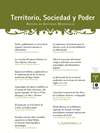Resumen
Resumen:* El propósito de estas líneas es esbozar algunas líneas de investigaciones sobre las aportaciones de la arqueología al debate sobre la transición entre el sistema antiguo y el feudal en la península ibérica. Más que un completo estado de la cuestión y una exhaustiva reseña de la bibliografía, pretendemos resaltar algunas preocupaciones e interrogantes históricos actuales frente a tradicionales temas de investigación. Así, contrastamos las líneas de trabajos clásicos (enterramientos, iglesias, castillos, metalistería, cerámicas, etcétera, desde época visigoda a medieval) con las recientes perspectivas historiográficas y métodos interdisciplinares en el estudio sobre la transición y evolución de las sociedades antiguas a la formación de las estructuras feudales: el estudio del poblamiento, la organización territorial y las estructuras socioeconómicas alcanzan así su pleno desarrollo en las investigaciones arqueológicas.
Palabras clave: arqueología, historiografía, Antigüedad tardía, Altomedievo, feudalismo, sociedad, poblamiento, territorio.
* Este trabajo fue realizado en 2004 en el marco de los proyectos de investigación Naturaleza y evolución de las estructuras de poder en la primera Edad Media asturiana (DGI, Ref. MCT-02-BHA-04170-C0503) y Formas de ocupación rural en el cuadrante noroccidental de la Península Ibérica. Transición y desarrollo entre las épocas romana y medieval (MEC, DGI HUM2004-04010-C02-02/HIST).
Abstract: The aim of this paper is to reveal the current state of knowledge of this subject in Spain, although recognising the complexity entailed in summarising such a broad period and such a heterogeneous area. In addition, attempting to give an account of the different trends means running the risk of excluding many specific contributions in favour of more general summaries. Therefore, rather than giving an exhaustive report of the background and initial research we aim to show the current research lines, as well as to make a critical balance and some proposals for the future.
First, we will review and briefly report the current situation regarding the subjects of traditional research on the Late Antiquity period in the Iberian peninsula, mainly the Visigothic settlement, that was theorised based on the funeral findings found in necropolis from the early 20th, as well as religious monuments, that were studied from an artistic rather than an archaeological perspective at around the same time. Then, we will go on to focus on more pressing aspects for more recent historiography, such as the transition between the Ancient and the Medieval world. In line with the renovation of this historical debate in the European context, the transformation of the socio-economic structures is beginning, in the last few decades, to also be studied from the archaeological register, adding to the theoretical debate anticipated by the Antiquity historians -on the fall of the Roman Empire- and of the Middle Ages -on the formation of feudalism. In this sense, studies on the transition between Late Antiquity (4th to 7th Centuries) and the Early Middle Ages (8th to 10th Centuries) have taken on great importance, with questions being considered such as the continuity, breakdown or degree of transformation in the different social formations, and for which the archaeological register can offer some answers. Added to the traditional subjects (cemeteries and churches), that were interpreted from a reductionist perspective to value the Germanic presence and superiority, are others such as the transformation of urban areas, changes in the settlements and territorial occupation, or the new forms of production organisation. In this way, the perspectives from which to analyse the population structures, agricultural or craft production, as well as products (pottery, metalwork, etc.) take on a new dimension, far removed from normativism and set within the framework of the current lines of the debate on the transition. In the same way, with this the importance of the Visigothic period has been clarified and its importance played down and, in particular, the date 711 as an impassable barrier between the two periods, two worlds and even two different and independent academic specialities.
Keywords: archaeology, historiography, Late Antiquity, Early Middle Age, feudalism, society, settlement, territory.

